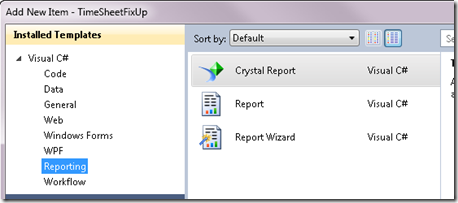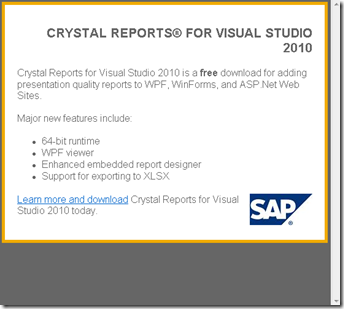Ever since Visual Basic 2 released in 1993, Crystal Reports has been an integral part of the Microsoft developer experience. Up until this article is released, Crystal Report 2010 has not yet come up. The developers on BusinessObjects are still working on the beta version and the full release is due on Q3 2010.
Even though this product has not been fully released yet, we can take a “sneak preview” of changes made on this Crystal Report 2010 version, what exciting new features we can expect and things that remain on this version. This article will elaborate Crystal Report 2010 product feature in a concise way. For anyone that is looking to host Crystal Report, you can consider asphostcentral.com as your crystal report hosting provider.
Things that change on Crystal Report 2010:
- Crystal Reports will no longer be included in Visual Studio 2010
- Instead, Crystal Reports for Visual Studio 2010 will be provided by SAP as a free download, no registration required
- Because its now delivered separately, the delivery dates don't exactly line up
- A production release will be no later than Q3 2010
- The EULA for Crystal Reports for Visual Studio 2010 will match the Crystal Reports 2008 EULA. The only material change when comparing the EULA with Visual Studio 2008 is that free external redistribution for web applications is no longer included. Its purchased separately with the Crystal Reports Developer Advantage runtime license
- The MSM runtime will be unavailable. MSI and ClickOnce will be the supported deployment methods for the runtime engine

Things that do not change on Crystal Report 2010:
- Unlimited internal distribution of thick client and server applications that embed the Crystal Reports for Visual Studio 2010 runtime is included - same as Visual Studio 2008
- Unlimited external distribution of thick client applications that embed the Crystal Reports for Visual Studio 2010 runtime is included - same as Visual Studio 2008
- Both 32-bit and 64-bit runtimes are available. This is unchanged compared to Crystal Reports Basic for Visual Studio 2008, but the presence of a 64-bit runtime is a major net new feature for Crystal Reports 2008 customers

New Features in Crystal Report 2010:
- New WPF Viewer
- New XLSX export to take advantage of the big grid for data-only Excel exports
- Improved report viewing experience provides more interactivity to end users of your reports
- New read-only RPT file called RPTR that allows you to control who can see the internals of your report design. You create a RPTR file by exporting it from an RPT. After that, RPTR files can only be opened by the report viewers. oUR Report designer tools will refuse to open RPTR files - protecting your internal business logic in the report
- Improved embedded report designer - for example you can now create dynamic, cascading parameters
- Various .NET API improvements to improve the migration for COM-based RDC customers
- Lighter weight English-only runtime for reduced deployment size
- More flexible MSI deployment to replace MSM use cases
In conclusion
Visual Studio 2010 allows developers to:
- Receive Crystal Reports in a different manner than before
- Continue to benefit from a free version of Crystal Reports that's fully integrated with Visual Studio
- Get a significant upgrade in features compared to Visual Studio 2008
- See slight modifications to licensing that will mostly impact those who redistribute web applications externally